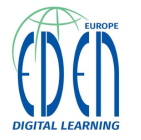Current trends and future challenges for quality assurance in the fields of open learning and eLearning
As open education and eLearning mature and become mainstream across the world, the discussion on quality assurance emerges with a renewed importance, strength and impact in our field of practice. Although there are significant variations in how this topic is addressed in each regional context, there’s an underlying feeling which is shared by all stakeholders. It relates to the urgency of establishing effective processes that positively discriminate appropriate practices in online learning, as not all that glitters is gold, to use the famous Shakespearian quote.
EDEN has always paid close attention to this discussion and has contributed throughout the years to the development of an European expertise in this topic. Most notably, the EDEN 2003 annual conference, held in Rhodes, and the EDEN RW6, which took place in Budapest, in 2010, both focusing specifically on the topic of quality assurance in open, distance and eLearning, were major milestones in the consolidation process of a European quality culture in open, distance and digital education.
In the current context and given the strategic importance of this discussion, EDEN has been called by the professional community to play an even more active and leading role in this discussion. We recognise the relevance of this movement and as a consequence, new significant initiatives related to the topic of quality will be announced in the coming months.
In today’s post, I’ve invited my good friend Ebba Ossiannilsson, who is also a member of the Executive Committee and an EDEN Fellow to share with us her views on this very important discussion. Ebba is a well-known expert in the topic of quality assurance in open education and eLearning and has a large experience world-wide.
In her post, Ebba identifies the current trends and future challenges for quality assurance in our field and presents a brief conclusion of the study on quality models conducted in the framework of an initiative lead by our partner ICDE.
António




